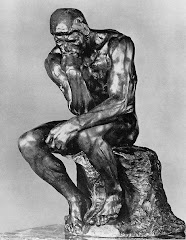It is a shame that I haven't read the original of two of India's greatest epics - which can easily be called THE GREATEST epics ever written in the history of human civilization - Valmiki's Ramayana, and Veda Vyasa's Mahabharat. In fact, I don't think I know anybody from my generation - from 10 years older, to 10 years younger - who has read these grand poems of ancient India. Yes, most people do know the basic stories - especially from the serializations on TV which had become a rage way back in 1988-1990 - from almost comic-strip versions in (at least some) schools - and, possibly, from their grandparents.
It is a shame that there are no complete & convincing translations of these two works available in the market, though "The Illiad", "The Odyssey", and "The Aeneid" are available even in India, in every nook & cranny (though nobody's interested in them any longer, too). Indian markets were always filled with Shakespeare, but it is only in the last 2-3 years that Kalidasa's works can be found on book-shelves in multiplex bookstores (which are rare & empty enough to look ridiculous).
Well, I was just going through an online text (which is very fortunate!), and came across this passage on the importance of a WIFE, which was very interesting, especially as a clear demonstration of the respect & even sacrosanctity that the fair sex commanded, in Hindu culture. These words are spoken by a woman herself - Shakuntala - to her husband, the King Dushyant (also written as "Dusmant"). I'll separate the lines for emphasis, rather than present them in one paragraph. I doubt if the translation conveys the MEANING - that is, the true underlying essence - of the words or terms used in the original (which must have been Sanskrit). Though the translation is by an Indian - that itself is no reason to accept that the words convey the deeper truths or abstractions - they might be just too literal, as Sri Aurobindo so convincingly proves on his commentary on the Rig Veda. Anything given in the parentheses is by me.
Here goes:-
The wife is a man's half.
(That's why, in Indian culture, the wife is called "Ardhangini" - that is, literally, "half of the body", in the wider sense of "being", "existence", "identity". The God Shiva (or Maheshwar, Mahadev etc.) is often portrayed as being half-masculine, & half-feminine: and in such a form, is known as "Ardhanari" - the literal translation being "Half-woman". The feminine-half is his Shakti, literally "Power", without whom Shiva cannot create, without which Spirit can never manifest. It is from the primeval Hindu "Adanari" that the Hebrews derive their "Adonai". The Ardhanarishwara or Adanari has been the subject of some of the most beautiful, glowing creations in the history of Indian art & sculpture.)
The wife is the first of friends.
The wife is the root of religion, profit, and desire.
The wife is the root of salvation.
(I should've posted this on 8th of March!)
They that have wives can perform religious acts.
They that have wives can lead domestic lives.
They that have wives have the means to be cheerful.
They that have wives can achieve good fortune.
Sweet-speeched wives are friends on occasions of joy.
They are as fathers on occasions of religious acts. They are mothers in sickness and woe.
Even in the deep woods to a traveller a wife is his refreshment and solace.
He that hath a wife is trusted by all.
A wife, therefore, is one's most valuable possession.
Even when the husband leaving this world goeth into the region of Yama, it is the devoted wife that accompanies him thither. A wife going before waits for the husband. But if the husband goeth before, the chaste wife followeth close.
For these reasons, O king, doth marriage exist.
The husband enjoyth the companionship of the wife both in this and in the other worlds.
It hath been said by learned persons that one is himself born as one's son. Therefore, a man whose wife hath borne a son should look upon her as his mother.
(This is a true & interesting, if not complete, reason why many gods of old were known as the "Father, Son, & Husband" of their goddess-wives. In another place, Shakuntala tells Dushyant: The husband entering the womb of the wife cometh out himself in the form of the son. Therefore is the wife called by those cognisant of the Vedas as Jaya (she of whom one is born). This is one of the chief reasons why so much importance has been accorded to male-offspring in all cultures since time immemorial. Horus is Osiris - Jesus Christ is the Father. And Horus, the Egyptian God & son of the Creative Logos Osiris, is known as "the Bull of his Mother" - the bull being a universal religious symbol, amongst other things, of the masculine, fecundating, reproductive power in the cosmos & nature).
Beholding the face of the son one hath begotten upon his wife, like his own face in a mirror, one feeleth as happy as a virtuous man, on attaining to heaven.
(No doubt a woman is a gateway to heaven!)
Men scorched by mental grief, or suffering under bodily pain, feel as much refreshed in the companionship of their wives as a perspiring person in a cool bath.
(Now this is important, like the most relevant, practical summation:-)
No man, even in anger, should ever do anything that is disagreeable to his wife, seeing that happiness, joy, and virtue,--everything dependeth on the wife.
A wife is the sacred field in which the husband is born himself. Even Rishis cannot create creatures without women.
Do we begin to glimpse the immense reverence accorded to marriage & women in their role as wives, in ancient Hindu culture?





